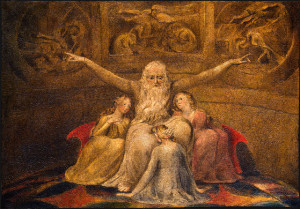 SO, WHAT WAS JOB LIKE as a father? Would he have been voted the “Father of the Year?” Well, considering his children were all killed in the first chapter of the book, and his wife—after her less-than-encouraging “Curse God and die” advice—is strangely silent throughout, we have very little to go on.
SO, WHAT WAS JOB LIKE as a father? Would he have been voted the “Father of the Year?” Well, considering his children were all killed in the first chapter of the book, and his wife—after her less-than-encouraging “Curse God and die” advice—is strangely silent throughout, we have very little to go on.
What We Do Know
However, what we do find in the text speaks volumes. And even more, since the writer chooses to highlight Job’s fatherly characteristics so early in the book, perhaps they are even key to understanding him as a man and as a character in God’s drama.
Look at Chapter 1, Verse 4 and following. Job apparently enjoyed a good party and didn’t discourage his children from celebrating their birthdays (their “days”). His sons and daughters apparently got along well and enjoyed each other’s company. I know my parents wished that for me and my siblings, and I now wish it for my own children.
Whether he was present at those parties or not, we don’t know. Maybe sometimes, but probably not all the time, the way the text is written. After all, he was a successful businessman. He probably traveled a lot. But these were adult children we’re talking about, children with homes of their own. No pin-the-tail-on-the-donkey games and bouncy houses here. These were grown-up parties. And at adult parties, adult sins might take place—especially in prosperous circumstances.
Job knew this (Job 1:5), and he was concerned that they might have committed visible, known sin. But even more, he was concerned that they may have “cursed God in their hearts.” How many parents pray for their children’s thought life?
Sacrifice the Party Animal
So, what did Job do about it? Well, serving as the priest of the family, we can only surmise that he had already taught them the ways of the Lord. Now, it was up to his sons and daughters to follow those ways, not only in their external behavior but deep in their hearts as well. He did, however, pray for them and actually sacrifice for them. We don’t know whether this was a common practice at the time, but I daresay it would be rare today.
Of course, on this side of the cross, we no longer trust in animal sacrifice for sin, but do we believe in and practice intercessory prayer for our children and other family members? Apparently, Job did. And mentioning that fact this early in the book truly shows his exemplary nature as a faithful father and follower of God.
The Children We Deserve?
In later chapters, there are at least two other interesting indications of Job’s belief that children were a great blessing. One example states that the wicked sometimes get what they don’t deserve in regards to children. The other states what their children do deserve, at least in Job’s way of thinking.
In Job 21: 8-9, Job states that—in contrast to his own experience—the wicked see their children established around them, that they are safe from fear, and dance around like lambs (perhaps picturing his own children dancing in their homes, celebrating each other’s existence). Then he poignantly adds, as if hoping God is listening, “no rod from God strikes them.” (Emphasis mine.)
Then elsewhere, Job states that he thinks the children of the wicked should be destined to death, hunger, and pestilence (Job 27:14). Further, he bares his bitterness by repeating an apparently common saying of his time, that God stores up a man’s wickedness for his sons (Job 21:19). Job does some wishful twisting by desiring that God would punish the wicked man himself, not his children. That way the wicked would know their own guilt (and, hypothetically, Job’s children would have therefore avoided it!)
Job the Equal Rights Father
After Job’s travails were over and [spoiler alert] God had restored his wealth and had given him more children, his spirit of care and generosity continued. And that spirit was especially shown to his daughters, as is recorded in the last chapter of the book: “… in all the land there were no women so beautiful as Job’s daughters. And their father gave them an inheritance among their brothers …” (Job 42:15), a practice that usually only occurred when there were no sons.
It appears that, from the beginning to the end, Job was a caring, generous, faithful, and watchful father, and thus totally undeserving—in our way of thinking—of any of the torture that his God would shortly put him through.
But more on that in future posts.
My husband and I do daily intercede for the faith of our children and grandchildren. Perhaps not specifically enough. I can’t say that we have ever sought forgiveness on their behalf.